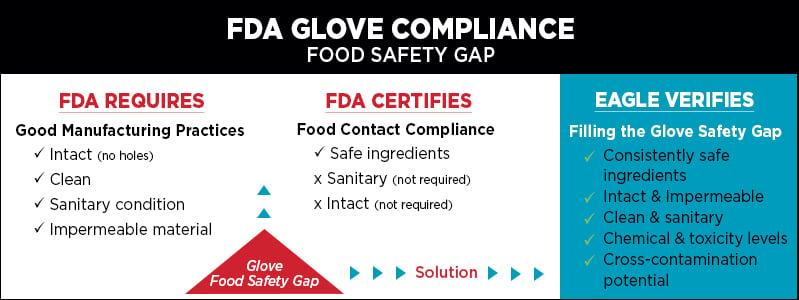Single-use gloves are outlined by the FDA :
-
In Current Good Manufacturing Practices (GMP)1
- This states: Maintaining gloves, if they are used in food handling, in an intact, clean, and sanitary condition. The gloves should be of an impermeable material.
- This states: Maintaining gloves, if they are used in food handling, in an intact, clean, and sanitary condition. The gloves should be of an impermeable material.
-
As tested compliant for food handling2
-
Food handling gloves certified under the FDA must consist of materials generally recognized as safe for use in food or food packaging. If the gloves tested pass the requirements, they may then be labeled FDA Compliant for Food Handling.
Manufacturers must only pass this test once for the gloves to be compliant. Testing is not officially confirmed, repeated on entry into the US, or required at any other time, other than the glove samples initially tested by the factory. This lack of ongoing manufacturer compliance or quality control allows the opportunity to add cheap raw materials, often introducing toxic compounds and chemicals, fungal and microbial contaminants and poor quality control processes.
-

In summary, FDA Compliant food handling gloves:
-
Have no requirement to be tested for and be sanitary (clean).
- Independent microbial testing of 25 new and unused other branded (not Eagle) “food grade” gloves found E. Coli, listeria, mold, fungus, feces among other pathogens on inside and outside glove surfaces, from contaminated water sources and unsanitary factory conditions. Read more about the critical control points of glove manufacturing here.
Ironically, gloves deemed FDA Compliant for food handling, are therefore, in our opinion, not certified food safe for your manufacturing practice, as outlined in the GMP.
- Independent microbial testing of 25 new and unused other branded (not Eagle) “food grade” gloves found E. Coli, listeria, mold, fungus, feces among other pathogens on inside and outside glove surfaces, from contaminated water sources and unsanitary factory conditions. Read more about the critical control points of glove manufacturing here.
- May contain toxic chemicals which could impact food safety and glove user health.
-
Have no requirements to be intact.
- That is they have no limits to the maximum amount of pinhole defects a box of gloves may contain (acceptable quality level, AQL). Defective gloves are not food safe.
- That is they have no limits to the maximum amount of pinhole defects a box of gloves may contain (acceptable quality level, AQL). Defective gloves are not food safe.
Therefore, food handling gloves certified under FDA Title 21 CFR Part 177 are not required to be intact, clean, or sanitary, or to be tested on arrival in the US. Ironically, gloves deemed FDA Compliant for food handling are therefore, in our opinion, not certified food safe for your manufacturing practice, as outlined in the GMP.
Commonly, when we talk to food manufacturers they say the disposable gloves they use during production are 'FDA approved.' This minimal, on-time testing does not verify your gloves are clean or free from holes and harmful chemicals. Glove manufacturers must simply pass one test to be 'compliant' with FDA requirements. The factories are following the compliance steps that the FDA has established.
At Eagle Protect, we believe that the current regulations don't go far enough to safeguard our food supply and everyone eating the products being produced. That is why we developed our proprietary glove quality testing program, Delta Zero. You deserve a consistently superior glove that you can rely on to uphold your stringent food safety standards.
Don’t risk a FDA violation with dirty, toxic or defective gloves. Demand and only use the world’s only independently tested and verified food safe gloves from Eagle Protect.
1FDA Title 21 CFR Part 110 - Current good manufacturing practice (GMP) in manufacturing, packing or holding human food
2FDA Title 21 CFR Part 177


